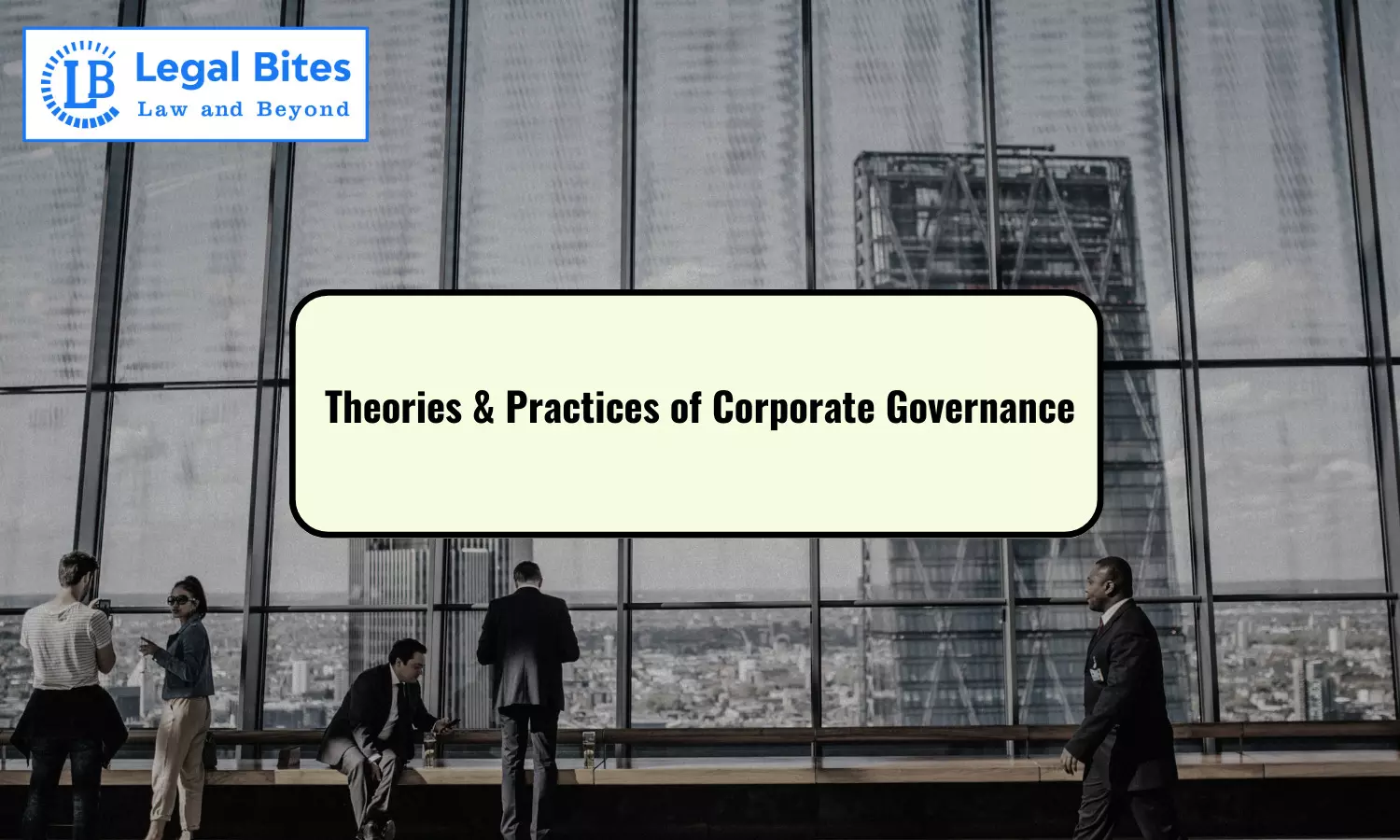Theories & Practices of Corporate Governance
The article 'Theories & Practices of Corporate Governance' refers to the concept of corporate governance and its traditional as well as modern approach to corporate governance

The article 'Theories & Practices of Corporate Governance' refers to the concept of corporate governance and its traditional as well as modern approach to corporate governance. The article further discusses the practices in past and present, along with various theories of corporate governance.
Introduction
The term "corporate" refers to the decision-making process and the method by which significant business decisions are carried out (or not), and its meaning dates back to the very beginning of human civilization. This governance is a decision-making process, and analysis focuses on the formal and informal individuals participating in the process and the mechanisms put in place to make and carry out the decisions and implement them themselves.
Corporate governance, a complex and multifaceted topic, analyses how businesses are operated and governed. It provides a new definition of governance from a practical and academic perspective. Corporate governance, historically, has combined contemporary corporate governance rules and structures with concerns about company law, regulatory practice, and administrative practice.
Approach to Corporate Governance
Traditional/Conventional
This strategy emphasises the ownership rights of the shareholders, their priorities, and the effects of the connection between the shareholders and management via the principal-agent relationship's economic and legal lenses.
Cadbury Committee: The commercial worldwide characteristics were drastically shifting in 1992. Reviewing the current traditional definitions and formulations of corporate governance to determine whether they accurately reflect reality will aid in illuminating one of the uncertainties relating to the impact of governance, namely why, with all the activity in developing policies, proposals, and principles over the past twenty years, governance lapses appear to have increased in frequency and worsened in severity.
Modern
The shifting dynamics of organisations in the twenty-first century were addressed through modern corporate governance, which strongly emphasises transparency, accountability, sustainability, and stakeholder involvement. The modern approach involves the interaction of numerous parties with varying motives and interests, including the Board of Directors, shareholders, management, regulators, auditors, and other stakeholders. The fundamental objective ensures the running of businesses effectively, transparently, responsibly, and ethically while balancing the requirements and expectations of all parties involved.
Long-term value development is a top objective, and effective risk management is essential. Activism by shareholders pushes changes in corporate practices that support their interests. Vital compliance programs, executive compensation alignment, sustainability and environmental stewardship, and adaptive governance are further components of modern governance.
Practices of the Corporate Governance
Governance Framework: These frameworks are often overlooked, the basis of how a company is governed and should be outlined to ensure:
- Effective Boards
- Transparency regarding Duties and Obligations
- Promoting Sustainable Business Practices
- Interaction with Shareholders and Accountability
Theories of Corporate Governance
Fundamental Theories of Corporate Governance include agency theory, which has implications for the idea of moral hazard and serves as the foundation for stewardship theory and stakeholder theory, as well as ideas of resource dependence, transaction costs, and political theory, further deepening this foundation. Later, the addition of efficient markets, information asymmetry, and ethics are added to these theories.
The causes and effects of variables such as the composition of the board of directors, audit committee, independent managers, the function of top management, and their interpersonal relationships outside of the legal and regulatory framework, untangling them from these ideas. Based on the causes and effects of several factors, such as the composition of the board of directors and audit committee, the independence of directors, the function of senior management, and their interpersonal relationships outside of the legal and regulatory framework, these theories are outlined.
There are many theories of corporate governance, thus, a few of them are discussed briefly below:
Agent Theory
"You cannot expect those who manage other people's money to be as careful and caring as it would belong to them. Waste and negligence are present, always, more or less, in the management of every business." – Adam Smith (1976)
The theory was developed in the early 70s of American literature. Although agent theory emerged in the 1970s, Berle and Means (1932) highlighted the division of the control government in the 1930s. The company's shareholders, or owners, are defined as the management or executives in charge of managing the firm on behalf of the shareholders. The agency theory explores the possibility of conflict in these relationships and recommends balancing the interests of agents and principals.
According to the agency theory, directors (the principal) are liable on behalf of shareholders (the principal) to act in their best interests and the interests of those who have mandated. However, the agent is not limited to making choices in the principal's best interests. It is necessary to align the interests of the managers and shareholders to prevent the competing interests of the manager from impairing their ability to maximise the company's value under various decision-making conditions. The following are the illustrations of this theory:
Moral Hazard Theory
The hazard Model is a theory within the agency theory that refers to the fundamental idea that the separation of power and control creates a conflict of interest that can lead to managers acting opportunistically and only sometimes in the best interests of shareholders, who act as principals and aim to maximize shareholder wealth. The theory also refers to the hidden actions or opportunistic behaviour of managers who work upon their interests. It may result in dramatic outcomes like poor performance or even corporate failure. To define a shared interest between managers and shareholders and to reduce moral hazard, the idea is strongly related to compensation management policy.
According to the Bucharest Stock Exchange's 2008 Corporate Governance Code, the board shall create a remuneration committee to help develop a compensation plan for directors and managers—establishment of the internal policies of the committee and evaluation annually. The way managers convey moral hazard can lead to either making risky judgments or using financial communications to boost managerial prestige and reputation.
Stewardship Theory
The theory is a management leadership approach that focuses on the role of management and developing an organisational value. The idea originates in psychology and sociology; it assumes that managers are faithful, responsive, and effective administrators of resources. According to the argument, directors and management serve shareholders' interests by ensuring the rise of their wealth. Steward theory presupposes that managers give the company's interests precedence in conflict of interest, in contrast to agency theory, which emphasizes managers' interests.
The Y Theory, on which the prediction of view took place, maintains that managers are rational individuals who don't require much supervision, which is one of the work incentive theories. The idea also emphasizes the significance of having a board of directors of company employees as the best equipped to identify issues and respond quickly. On the other hand, outside directors can only track corporate performance over the short term due to their scant understanding of daily operations.
Stakeholder Theory
The theory emerged as a response to the growing need for CSR in transitioning from an industrial society to a post-modern, post-industrial, post-capitalist, post-structural, and post-traditional society. The main emphasis of this theory is the interests of numerous stakeholders, such as owners, shareholders, investors, employees, clients, suppliers, business partners, rivals, the government, non-governmental organizations, pressure groups, communities, and the media. Stakeholder theory emphasizes the significance of maximizing a company's value while considering its social partners' interests.
Companies must offer value in the context of globalisation for shareholders, consumers, employees, and the environment to satisfy shareholders, inspire confidence in the company's future, and protect the setting for society. Stakeholder theory is the most influential corporate governance model in history because the corporate governance system ensures the alignment of these interests. This strategy helps the business succeed financially and gives it a competitive edge by fostering consumer confidence and goodwill.
Transactional Cost Theory
The theory is a complex theory focusing on the efficiency of the corporate governance structures during conducting transactions. The transactional cost theory was developed in 1938 by Ronald Coase, who claimed that setting up an organisation in charge of resource allocation can assist in avoiding some expenses associated with organising production through market channels.
As "operating costs of the economic system," according to Kenneth Arrow, transaction costs were what Williamson thought governance studies should focus on identifying, elucidating, and avoiding problematic contracts. In addition to transaction costs, consideration of agency costs caused by conflicting managerial and shareholder interests and disparities in information. These expenses are risks associated with using an agent and the expenditures for minimising those risks. Organisational economics and legal sciences present multidisciplinary challenges for transaction cost theory.
Resource Dependency Theory
This theory explains how organisations operate as open systems, with their decision-making based on their social and environmental and social relations. It emphasises the role of managers in providing essential resources for an organisation concerning the external environment. Managers contribute information resources, skills, and access to critical business partners, such as suppliers, creditors, government, and social groups.
According to the notion, managers can be divided into four groups:
- community influencers
- business experts
- support specialists
- insiders
The degree to which managers fit into these categories determines how much control they have when allocating resources. The idea highlights the complexity of the underlying "network" concept of corporate governance and the significance of knowing the environment in which organisations function.
Conclusion
The article discussed corporate governance with a traditional view and a modern view. Different practices of corporate governance are discussed too. Further, theories were briefly discussed. The agent theory, the moral hazard theory, the stewardship theory along with the stakeholder theory. Later, theories were added which were called the ethics theory, informational asymmetry theory or effects of variables. These ideas are distinct from the causes and effects of factors like the composition of the board of directors, audit committee, independent managers, the function of senior management, and their interpersonal relationships outside the scope of legal and regulatory requirements.
Various theories in the field of corporate governance examine factors such as the composition of the board of directors and audit committee, the independence of directors, the function of senior management, and their interpersonal relationships outside of the legal and regulatory framework. These theories aim to understand and analyze the causes and effects of these factors on corporate performance and governance practices
References
[1] Stephen Bloomfield, Theory and Practice of Corporate Governance: An integrated approach, 2013, Available Here
[2] A.C Fernando, Corporate Governance: Principles, Policies and Practices, 2009, Available Here
[3] Corporate Governance Best Practices that are Beneficial to Every Organization, Available Here
[4] Adrian Davies, Best Practice in Corporate Governance: Building Reputation and Sustainable Success, 2016, Available Here
[5] Theories of Corporate Governance, 2013, Available Here
[6] Classical and modern concepts of corporate governance (Stewardship Theory and Agency Theory), Available Here

